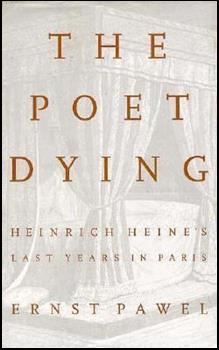If the opening of Ernst Pawel’s biographical study of Heinrich Heine doesn’t grab you, don’t bother to read on. But it if does, treat yourself to a great reading experience by getting hold of the book. It begins:
“The clotted mix of sanctimonious respect and unvarnished glee with which, in the summer of 1847, several German newspapers reported the death of Heinrich Heine reflected not only the wishful thinking of those who out of malice or gullibility concocted these premature obits but also [reflected] the exceedingly ambiguous position which Heine himself had occupied for so long in the world of both letters and politics. Indisputably Germany’s most popular poet since the death of Goethe, he was also a man who had consistently gone out of his way to provoke the hostility of friend and foe alike.
“Heine’s genius for making enemies, intimately linked though it may have been to his poetic inspiration, proved a more than problematic gift throughout much of his life A polemicist of matchless skills, he parried attacks with a virulent overkill that in at least two celebrated instances backfired badly and gained his opponents far more sympathy than they deserved. He regularly tended, moreover, to let himself be carried away by an exuberant sense of either justice or irony, or both, to the point of lashing out wildly and wittily without much regard as to choice of targets. These lightning and often preemptive strikes, his decided preference for smiting other cheeks rather than turning his own, constituted a clear and, to his contemporaries, decided break with the age-old Jewish tradition of passivity in the face of aggression. Yet even without any deliberate effort on his part Heine would have had no trouble antagonizing a broad range of the German public across the entire political spectrum merely by virtue of being himself.”
The Poet Dying includes a selection of Heine’s poems that runs to 80 or so pages, with the originals and the translations facing each other. Here’s an excerpt from one of the poems, a depiction of the Dutch slave trade that gives you a solid dose of Heine’s rich sarcasm.
The Slave Ship
The supercargo [captain] Mynheer van Koek
Sits in his cabin, stocktaking:
He's reckoning up the shipment's size
And the probable profit he's making.
"The rubber is good, the pepper is good —
Three hundred barrels and sacks;
There's gold dust too, and ivory tusks —
But the best goods are the blacks.
"At Senegal River I got dirt-cheap
Six hundred Negroes in trade;
Their flesh is firm, their sinews strong,
Of iron are they made.
"I got them in trade for beads of glass,
Some brandy, and iron gear;
If only half of them live, I'll make
Eight hundred percent all clear.
"If I still have only three hundred blacks
When we get to Rio d'Janeiro,
I'll get a hundred ducats a head
From the firm of Gonzales Perriero."
Then suddenly Mynheer van Koek
Was interrupted. In came
The little ship's surgeon through the door,
Van der Smissen by name.
His figure's bony, thin and dry,
His nose with warts is flaring —
"How goes it, sawbones," cried van Koek,
"How are my dear blacks faring?"
The doctor acknowledged the question, and said:
"I came here to announce
Last night the rate of death increased
By considerable amounts.
"The daily average death was two,
But seven died today,
Four men, three women — I had the loss
Put in the log straightaway.
"I had the corpses closely checked,
For these rogues are rascally
And sometimes pretend to be dead so that
They'll get thrown into the sea.
"The chains were taken off the dead,
And as I usually do,
I had the bodies cast overboard.
Before the morning was through.
"At once a swarm of sharks shot up
From deep down in the waters;
They like this black meat very much —
I consider them my boarders.
"They've followed in our wake since then
As the coastline faded from sight;
The beasts snuff at the corpses' scent
With a gourmand's appetite.
The poem continues for many more stanzas and concludes this way:
At the foremast stands Mynheer van Koek
And he folds his hands to pray: ...
"Oh, spare their lives for Jesus' sake
Who did not die in vain!
For if I don't keep three hundred head
My business is down the drain."


Publishing Heine’s poem in Helvetic’a is very good. I felt I could dive right into the substance without the usual getting acquainted period often required with another typeface such as—let’s say—Garamond.
Thanks!